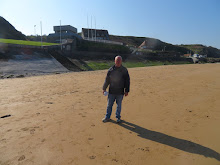Rather than hang around the District on the Fourth to listen to an oversized kindergartener give his version of the Revolutionary War, with real tanks as props, I left Atlanta the morning after I saw a ballgame at the Braves' new ballpark the evening before and drove to Andersonville, Georgia, to pay my respects to the thousands of Union POWs buried at the National Cemetery there, on the grounds of the notorious Andersonville Prisoner of War camp during the Civil War. 33,000 POWS were kept there within the wooden stockade during the last year of the war, without shelter from the elements and with little food and foul water, and 13,000 died, and many of the rest including, I think, a relative of mine, suffered from ailments because of their captivity there for the remainder of their reduced lifespan. (33,000 men occupied this field, within a wooden palisade, without shelter and scant food, drinking the polluted water trickling trough the ravine cutting across the field, downriver from the Rebel guards' camp, with only the clothes they arrived with.)
The open-air prison contained no officers, only non-coms, and military order quickly broke down and a hideous lawlessness reigned inside the camp, perpetrated by the Raiders, a gang essentially that preyed upon individual soldiers or prison newcomers who had not yet formed bonds with anyone, robbing, beating and killing them. These predators were opposed by the formation of a reprisal gang called the Regulators who identified the lot and especially the ringleaders and reported on them to the camp commandant, Major Henry Wirz (who was the only Confederate tried and executed after the war as a war criminal). (The six predatory gang leaders within the prison camp were hanged by their peers after a trial and buried apart from the thousands upon thousands of Union soldiers who perished from the inhumane conditions within the POW camp.)
Wirz arrested the identified Raiders, kept them apart from the main population while a military tribunal made up of inmates inside the prison put them on trial and delivered the six ringleaders back to the prisoners after a sentence of death by hanging was imposed upon them by their peers, who hanged them inside the prison on July 11, 1864. A raider leader named Patrick Delaney uttered his last words, "I would rather be hanged than to live the way most prisoners have to live." (The Raiders are hanged for their crimes.)
The six executed men were buried apart from the rest of the Union men in the burial grounds. Today a Union sentry stands vigilant guard over the thousands of men within the cemetery who gave their last full measure of devotion to the freedom we enjoy, for now. (Ever faithful to democracy, despite the individual cost.)
Friday, July 12, 2019
Subscribe to:
Post Comments (Atom)





No comments:
Post a Comment